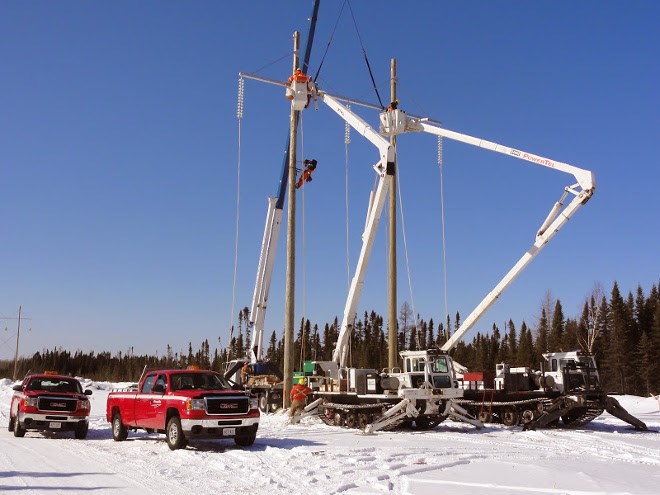A life-changing infrastructure project for northwestern Ontario has passed a regulatory hurdle.
The Ontario Energy Board has approved Wataynikaneyap Power LP (Watay Power)’s leave to construction application to proceed with the massive northwestern Ontario power line project.
The $1.6-billion project involves stringing 1,800 kilometres of power lines to connect 17 remote First Nation communities, north of Pickle Lake and Red Lake, to Ontario’s power grid for the first time.
The First Nation-owned utility filed their application last June.
The application to the OEB lays out the project details, including timelines, design and costs.
An April 2 Watay news release said the next steps, before construction starts, involves finalizing the financing, obtaining environmental assessment approvals, selecting an engineering firm and the companies that will handle the procurement and construction.
The first community hooked up to the grid was Pikangikum First Nation, north of Red Lake, with the switch thrown just before Christmas.
Construction for that 117-kilometre stretch began in the fall of 2017 from Red Lake into the distribution system at Pikangikum.
"The OEB’s approval authorizes Wataynikaneyap Power to construct and operate the Wataynikaneyap Power Transmission Project and deliver upon our commitment to bring reliable, sustainable and clean power to our First Nations communities in Northern Ontario,” said Margaret Kenequanash, CEO of Wataynikaneyap Power in a statement.
“We successfully connected Pikangikum to the provincial energy grid in December 2018 and are looking forward to connecting the rest of the First Nation communities who still rely on expensive, environmentally-unfriendly diesel generators for power.”
Wataynikaneyap is a licensed transmission company owned by 22 First Nations communities. It’s involved in a 51/49 per cent partnership with Fortis Ontario, a subsidiary of Fortis, a St. John’s NL electric and gas utility company with assets across North America.
In the release, Barry Perry, Fortis president-CEO, recognized the OEB approval as another major milestone in the development process.
“We are honoured to be working with our 24 First Nations partners in making this project, and access to clean, reliable energy, a reality for thousands of First Nation residents in Northern Ontario.”
The first of the two-phase project involves upgrading the transmission line and transformers to Pickle Lake, followed by connection of the communities to the provincial power grid.
According to timelines on Watay’s website, potential construction of the Pickle Lake phase could begin early this year with completion by late 2020.
Construction on the next phase could start later this year with the first connections slated for 2021.
For years, the communities have been powered with local diesel generators; an expensive, unreliable and environmentally unsustainable means of power production.
According to figures supplied last year by Watay Power, the project is estimated to create 769 jobs during construction and generate nearly $900 million in socio-economic value.




